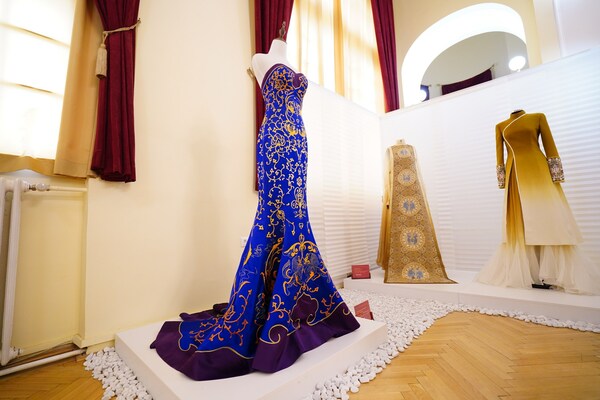BUDAPEST, Hungary, Oct. 30, 2023 /PRNewswire/ -- The exhibition titled "Charm of the Silk Roads: Auspicious Designs on Chinese Silk Art", running at the Hungarian Agriculture Museum until December 3rd. This exhibition is being jointly hosted by the China National Silk Museum, the Chinese Culture Center in Budapest, and the Museum of Applied Arts of Budapest.
The exhibition is divided into three sections: "Silk and the Silk Road", "Ancient Silk Patterns", and "Contemporary Revitalization and Application". Through ancient Chinese silk patterns and contemporary silk art, it showcases the diverse artistic trends in Chinese silk art development. The exhibition explores textile patterns, garment designs, and innovative applications of traditional culture. It features 60 sets/74 pieces of ancient silk fabric reproductions and contemporary garment art from the China National Silk Museum. This collection highlights the cultural exchanges between China and Hungary throughout history, emphasizing the Silk Roads' significant role in cultural transmission. Additionally, interactive handcraft projects such as "takeaway auspicious patterns" printing and small weaving machine weaving have been carefully designed on-site in order to enhance the exhibition experience.
Simultaneously with the opening of the exhibition, China National Silk Museum (CNSM) also unveiled its "Global Showcase" project. This initiative aims to develop a series of exhibitions about silk culture and Silk Roads that can be displayed globally in museums, universities, cultural centers, and public spaces. The project's objective is to establish a new international exhibition model called "taking a U disk, making touring exhibition." This model combines "Digital Virtual Display" with "Representative Star Exhibits," enabling the creation of easily installed yet distinctive exhibitions in various locations across the globe.
The term "Digital Virtual Display" refers to the interactive presentation of the China National Silk Museum's extensive collection of classic content that has been accumulated and examined throughout history. This content encompasses various aspects such as Chinese silk, the Silk Roads, and intangible sericulture and weaving technologies. The displayed content is continuously enhanced and updated uniquely at each location during its traveling exhibition.
The "Representative Star Exhibits" showcase the most significant examples of Chinese clothing, traditional patterns, motifs, and creatively designed artworks. These exhibits offer the audience a fresh and captivating perspective, providing new insights into the topics at hand. Furthermore, the exhibited items are adapted and modified based on the specific touring destination.
Compared with traditional touring exhibitions, "Global Showcase CNSM" has significant advantages in its consistency (with a classic model and upgraded based on each touring destination), flexibility (can fit in various spaces and venues), easy maintenance (remote maintenance and updating are possible), and sustainability (low cost and economic). " Global Showcase CNSM" is a systematic project to enhance the international exhibition branding of China National Silk Museum, which will further integrate the advantageous resources accumulated by CNSM throughout the past decades in the field of international cultural exchanges and collaborations, and further consolidate the foundation of global silk and silk-road network.
Prof. JI Xiaofen, Director of China National Silk Museum, said that she will strive to build the "Global Showcase CNSM" into an innovative, diversified, open, and win-win cultural publicity and display platform to promote cultural exchanges and cooperation between China and foreign countries. According to ZHANG Chengming, Deputy Director of the China National Silk Museum, Budapest is the first stop of launching the "Global Showcase CNSM", while more exhibitions will be exhibited in Uzbekistan, and Spain, among other places in recent years. The newly designed "Global Showcase CNSM" logo was also released at the event.
SOURCE China National Silk Museum
 Pages you might like
Pages you might like








 Latest information
Latest information
 Follow official account
Follow official account
 Online support
Online support
 鄂ICP备2022017323号
鄂ICP备2022017323号
 鄂公网安备 42018502006493
鄂公网安备 42018502006493
 Launch Exhibition
Launch Exhibition
 Release information
Release information




 Today's topic
Today's topic








